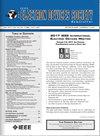Increased Threshold Voltage of Amorphous InGaZnO Thin-Film Transistors After Negative Bias Illumination Stress
IF 2
3区 工程技术
Q3 ENGINEERING, ELECTRICAL & ELECTRONIC
引用次数: 0
Abstract
Degradation phenomena featured with positive shift of the on-state transfer curve are reported for the amorphous InGaZnO (a-IGZO) thin-film transistors (TFTs) under negative bias illumination stress (NBIS). Such a positive shift is absent when the gate bias or the illumination is independently applied. With the assistance of TCAD simulation, the positive shift of the transfer curve is attributed to the generation of acceptor-like trap states, which is proposed to be due to oxygen interstitials produced as a consequence of electron generation by the illumination, acceleration under the effect of negative gate bias, and breaking weakly bonded oxygen. The proposed degradation mechanism is consistent with the low frequency noise characteristics and the degradation behavior under bipolar gate bias stress of the TFTs after NBIS. The whole degradation phenomena for the a-IGZO TFT under the NBIS are then consistently explained.负偏压照明应力后非晶 InGaZnO 薄膜晶体管阈值电压的增加
报告显示,在负偏压照明应力(NBIS)作用下,非晶 InGaZnO(a-IGZO)薄膜晶体管(TFT)会出现导通转移曲线正移的降解现象。在独立施加栅极偏压或照明的情况下,这种正偏移是不存在的。在 TCAD 仿真的帮助下,转移曲线的正向移动被归因于受体类阱态的产生,而受体类阱态的产生是由于照明产生的电子、负栅极偏压作用下的加速以及弱结合氧的断裂而产生的氧间隙。提出的降解机制与 NBIS 后 TFT 的低频噪声特性和双极栅极偏压应力下的降解行为一致。这样,a-IGZO TFT 在 NBIS 下的整个降解现象就得到了一致的解释。
本文章由计算机程序翻译,如有差异,请以英文原文为准。
求助全文
约1分钟内获得全文
求助全文
来源期刊

IEEE Journal of the Electron Devices Society
Biochemistry, Genetics and Molecular Biology-Biotechnology
CiteScore
5.20
自引率
4.30%
发文量
124
审稿时长
9 weeks
期刊介绍:
The IEEE Journal of the Electron Devices Society (J-EDS) is an open-access, fully electronic scientific journal publishing papers ranging from fundamental to applied research that are scientifically rigorous and relevant to electron devices. The J-EDS publishes original and significant contributions relating to the theory, modelling, design, performance, and reliability of electron and ion integrated circuit devices and interconnects, involving insulators, metals, organic materials, micro-plasmas, semiconductors, quantum-effect structures, vacuum devices, and emerging materials with applications in bioelectronics, biomedical electronics, computation, communications, displays, microelectromechanics, imaging, micro-actuators, nanodevices, optoelectronics, photovoltaics, power IC''s, and micro-sensors. Tutorial and review papers on these subjects are, also, published. And, occasionally special issues with a collection of papers on particular areas in more depth and breadth are, also, published. J-EDS publishes all papers that are judged to be technically valid and original.
 求助内容:
求助内容: 应助结果提醒方式:
应助结果提醒方式:


